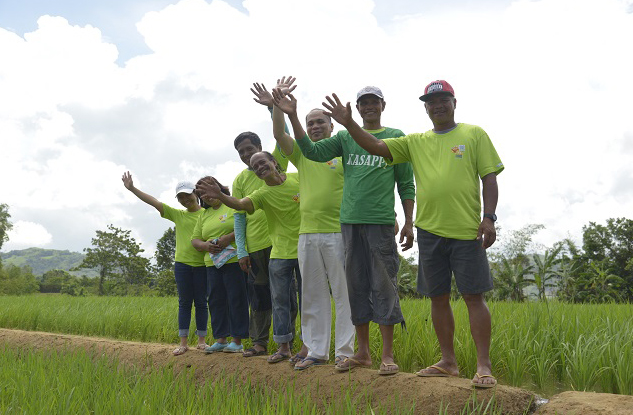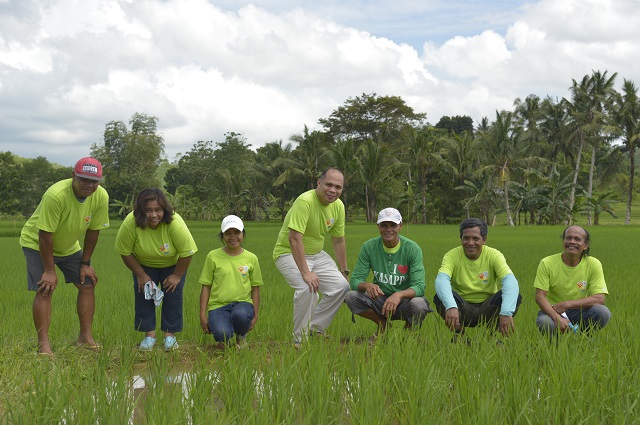The Iloilo City Hall is more than just an edifice housing its top officials and the important documents of the locale. If visitors will look up to see the top of its structure, they will see the bronze statue of a woman holding a bunch of harvested rice. The statue, which is called Lin-ay sang Iloilo (Lady of Iloilo), is said to symbolize Iloilo’s culture, including its abundant rice harvest. This was indeed reflected in the 2017 PSA report since the province made it as the fifth top rice producing province in the country with 937,000mt harvest.
In as much as the statue represents the rich culture of the province in terms of rice farming, looking into the lives and stories of the farmers who reap rich harvests also appreciates more profoundly the province’s great contribution to the rice industry of the country.
The story of KASAPPI
While the Lin-ay sang Iloilo is a magnificent lone statue, KASAPPI’s story is a testimony to how being organized as a group instead of acting alone could benefit the province, the country, and of course the farmers. This story is also an illustration of how an organization can spell the difference by going the extra mile of connecting to others.
Edmund Sanchez recalled that it all started in 2007 when the Center for Agrarian Reform and Rural Development (CARRD) formed the Kaitlingban Sang mga Agraryo Padulong sa PagUswag sang Iloilo Agrarian Reform Beneficiary Multipurpose Cooperative (KASAPPI ARB MPC) in Passi City. It puts together farmers planting organic rice, conventional rice, and sugarcane who have grown prominent because of their organic rice processing and marketing initiatives. CARRD, an NGO, did this as part of their program on sustainable agriculture and enterprises.
CARRD then already recognized the importance of organizing farmers into a cooperative. Edmund, CARRD’s area coordinator in Iloilo, said that perks like access to farm machinery, farm inputs, and loans are just within the reach of the farmers if they join a cooperative. He also said that aside from organizing KASAPPI, linking them with government, other NGOs, and institutional buyers is another part of the formula in ensuring the sustainability of the group enterprise. These initial partnerships yielded opportunities for KASAPPI such as the acquisition of an organic rice milling facility and training on organic rice farming.
Partnerships, through thick and thin
KASAPPI’s Jose “Joe” Amora and Noni Baradas joyfully told some anecdotes about their partnerships with different organizations. These stories range from the lowest times of their group to the most stable ones.
Joe remembered that their partnership with DAR rescued their sinking boat when they were on a financial slump in 2010. “Should we still carry on?” was the question they all asked each other when they held a face-to-face meeting to talk about the situation.
The answer to the question turned to yes when DAR’s Agrarian Reform Connectivity, Community, and Economic Support Services (ARCCESS) Program and Agricultural Production Credit Program (APCP) dovetailed with the financial slump. With the two programs combined, they were granted farm implements and loans that helped them get through. Joe also added that more members registered with the cooperative after this. Currently, KASAPPI has over 400 members.
Their partnership with DAR also helps when it comes to land tenure. Edmund believes that owning the land they till is a huge factor in uplifting farmers’ lives as they are more empowered to make decisions in farming and marketing their products.
On the marketing side, KASAPPI is connected to different institutional buyers such as Global Organic Wellness Corporation (GlowCorp), Iloilo local Go Negosyo centers, Iloilo Supermart, National Food Authority in Pototan, among others.
KASAPPI also has harmonious collaboration with other cooperatives that advocate organic farming in the province. They work together in anchoring the radio program titled Mangunguma Dungannon ka, sa organiko nga pagpanguma! (You’re an honorable farmer with organic farming) to promote farming practices and the benefits of their organic products.
After 11 years, the tight connection between KASAPPI and CARRD has remained. This connection did not mean dependency, though. For Edmund, “It is a little difficult at the start. You really have to care for the group like they are your baby. But now, they are empowered. They are starting to forge partnerships on their own.”
Their anecdotes show that KASAPPI have partners through thick and thin, from production to promotion, making them strong in covering broader roles in the rice value chain. Edmund proudly shared that KASAPPI is equipped especially in the postharvest aspects of farming. “When we go to fora, we always hear how other groups lament the lack of postharvest facilities. In KASAPPI, we already have what we need in production, processing, and marketing.”
Strong connection to what they do
Among all the benefits they reap from being connected, Edmund said that teaching them to connect with their land was one of the most important. By doing so, they hope to imbibe the spirit of stewardship so that the farmers will take good care of the parcels of land granted to them through the reform programs. With this teaching and all the connections that helped them sustain livelihood in those parcels, farmers would less likely think of selling their lands.
Strong connection to what they do in organic farming was also emphasized by Joe. He said that their operations, from production to marketing, strongly adhere to the organic rice farming internal quality control system. Another proof of this dedication to achieving quality organic products is the certification KASAPPI received from the Organic Certification Center of the Philippines in 2016 along with their partner CARRD. The group was also recognized by the DA-RFO 6 through the Outstanding Small Farmer Group Award in the 2017 Organic Agriculture Achievers.
Indeed, Joe and his co-farmers will feel less of an island because of their connection within KASAPPI and also among other organizations. Their story shows that going beyond organizing by being immensely connected to what they do, as well as with relevant partners, can go a long way in reaping better harvest for themselves, the province, and the country as a whole.






